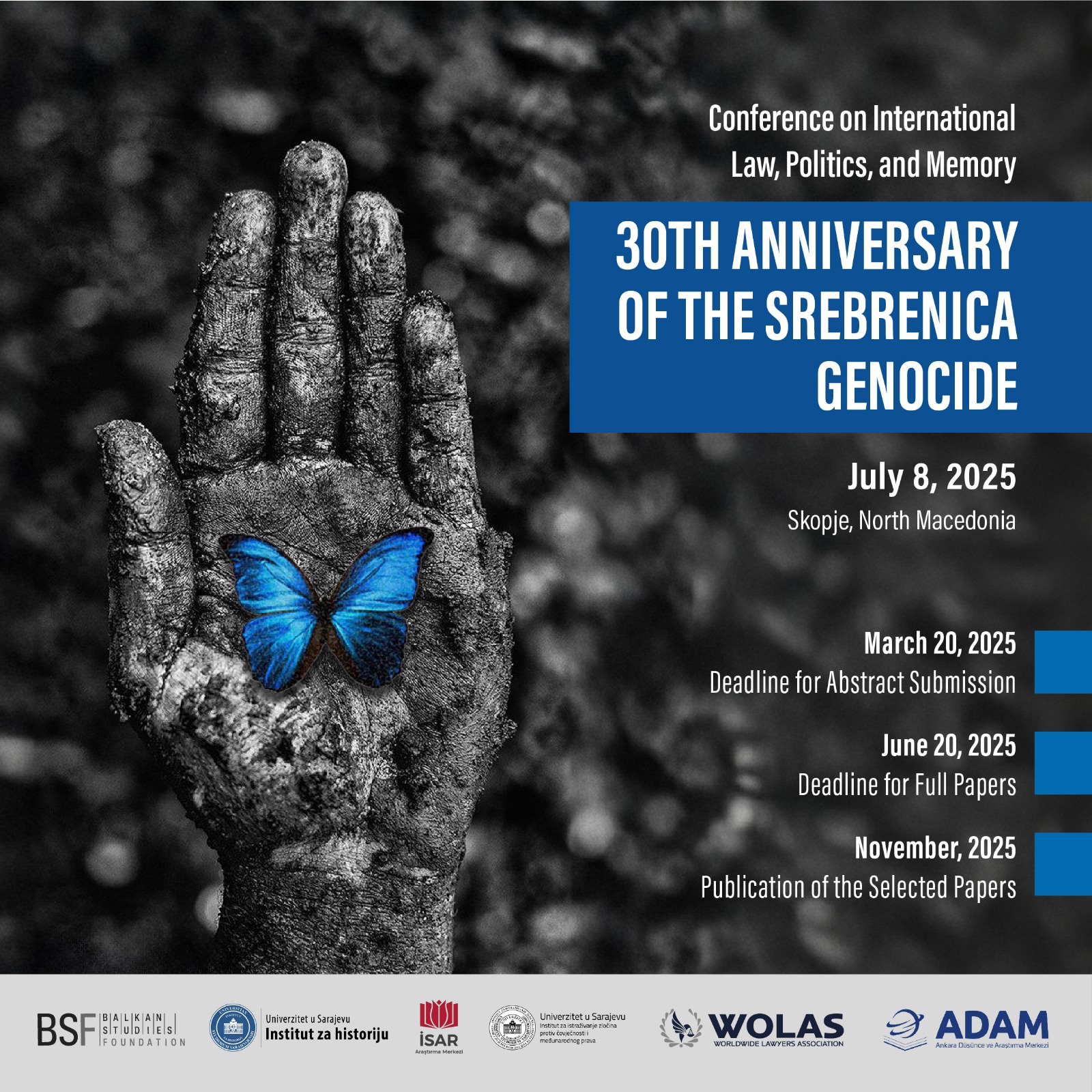
July 8, 2025, Skopje-North Macedonia
Call for Papers
The year 2025 marks the 30th anniversaryof theSrebrenica Genocide and the signing of the Dayton Peace Agreement, two pivotal events that shaped the modern history of Bosnia and Herzegovina and the broader Balkans region. The Srebrenica Genocide, recognized as the largest atrocity in Europe since World War II, reflects the challenges of international law, politics, and memory in post-conflict societies. The Srebrenica Genocide represents a tragic violation of human rights that took place in July 1995 in Srebrenica, a “safe area” declared by the United Nations. Over 8,000 Bosniak men and boys were systematically killed by Bosnian Serb forces. This massacre remains the largest mass killing in Europe since World War II and starkly highlights the international community’s failure to prevent genocide.
To mark the 30th anniversary of the Srebrenica Genocide, a commemorative event aims to bring together legal scholars, political scientists, historians, sociologists, human rights activists, and memory studies experts.
Application Link: https://forms.gle/cVw3ucszeKKkn8BR7
Conference Objectives
Conference Themes
The conference will examine the effectiveness of international legal institutions, such as the International Criminal Tribunal for the former Yugoslavia (ICTY), in prosecuting war crimes and genocide. Discussions will focus on the successes and challenges of delivering justice to the victims of Srebrenica and the broader implications of these legal responses for global justice systems. This theme aims to assess how international law has addressed atrocities and identify areas for improvement in preventing and prosecuting future crimes against humanity.
This theme will examine the political reasons behind the delayed intervention of international actors such as the UN, NATO, and the EU during the Srebrenica Genocide. It will also assess how human rights and humanitarian intervention were sidelined in political decision-making processes. The long-term impact of the genocide on Bosnia-Herzegovina’s current political structure and societal dynamics will also be analyzed.
Addressing the legacy of the Srebrenica Genocide, this theme will explore the importance of memory work in reconciliation and fostering a collective commitment to justice. National and international initiatives aimed at commemorating victims and promoting healing will be discussed, alongside the role of education, memorialization, and cultural heritage in sustaining peace. This theme underscores the necessity of preserving the memory of atrocities as a foundation for long-term reconciliation and societal harmony.
/
Submission Guidelines
We invite submissions of abstracts that address any of the above themes. Abstracts should be no more than 300 words and must be submitted by March 20, 2025. Please include a title, author name, affiliation, and contact information. Notifications of acceptance will be sent by April 1, 2025.
Costs
There is no registration fee for participating in the conference. We are pleased to offer funding for travel and accommodation expenses for a select number of papers, subject to review and approval.
Conference Schedule
March 20, 2025, Deadline for abstracts
April 1, 2025, Annoncement of accepted abstracts
June 20, 2025, Deadline for full papers
June 30, 2025, Announcement of the Conference program
July 8, 2025, Conference Date
November, 2025, Publication of the selected papers
/
Organizing Committee
Dr. Sevba Abdula, Balkan Studies Foundation (North Macedonia)
Assist. Prof. Dr. Hasan Basri Bülbül, Boğaziçi University (Türkiye)
Assoc. Prof. Dr. Bujamin Bela, Mother Teresa Univeristy (North Macedonia)
Assoc. Prof. Dr. Tahir Kılavuz, Marmara University (Türkiye)
Prof. Dr. Mehmet Bulut, Zaim University, (Türkiye)
Dr. Sedad Bešlija, University of Sarajevo Institute of History, (Bosnia-Herzegovina)
Hanife Etem, Balkan Studies Foundation (North Macedonia)
Elif Rushiti, Balkan Studies Foundation (North Macedonia)
/
Scientific Committee
Prof. Dr. Ali Emrah Bozbayındır (Türkiye)
Prof. Dr. Admir Mulaosmanovic, Balikesir University (Bosnia-Herzegovina)
Prof. Dr. Ahmet Hamdi Topal (Türkiye)
Prof. Dr. Mehmet Hacisalioğlu (Germany)
Prof. Dr. Berdal Aral (Türkiye)
Assoc. Prof. Dr. Ali Osman Kuşakçı (Türkiye)
Dr. Polona Florijančič (Slovenia)
Dr. Luigi Daniele (United Kingdom)
Dr. Andre Maria Pellicioni (Italy)
Dr. Jasmin Medić (Bosnia-Herzegovina)
Dr. Mumaer Džananović (Bosnia-Herzegovina)
Dr. Hikmet Karčić (Bosnia-Herzegovina)